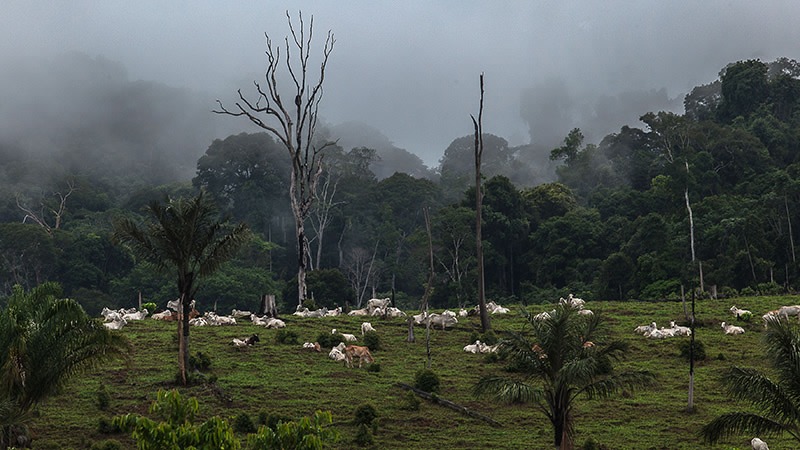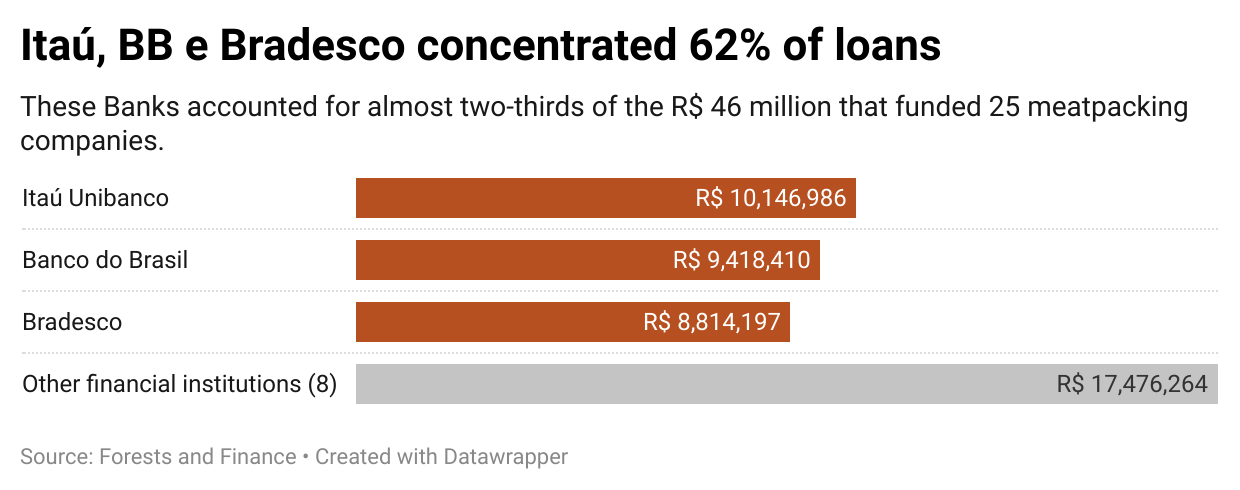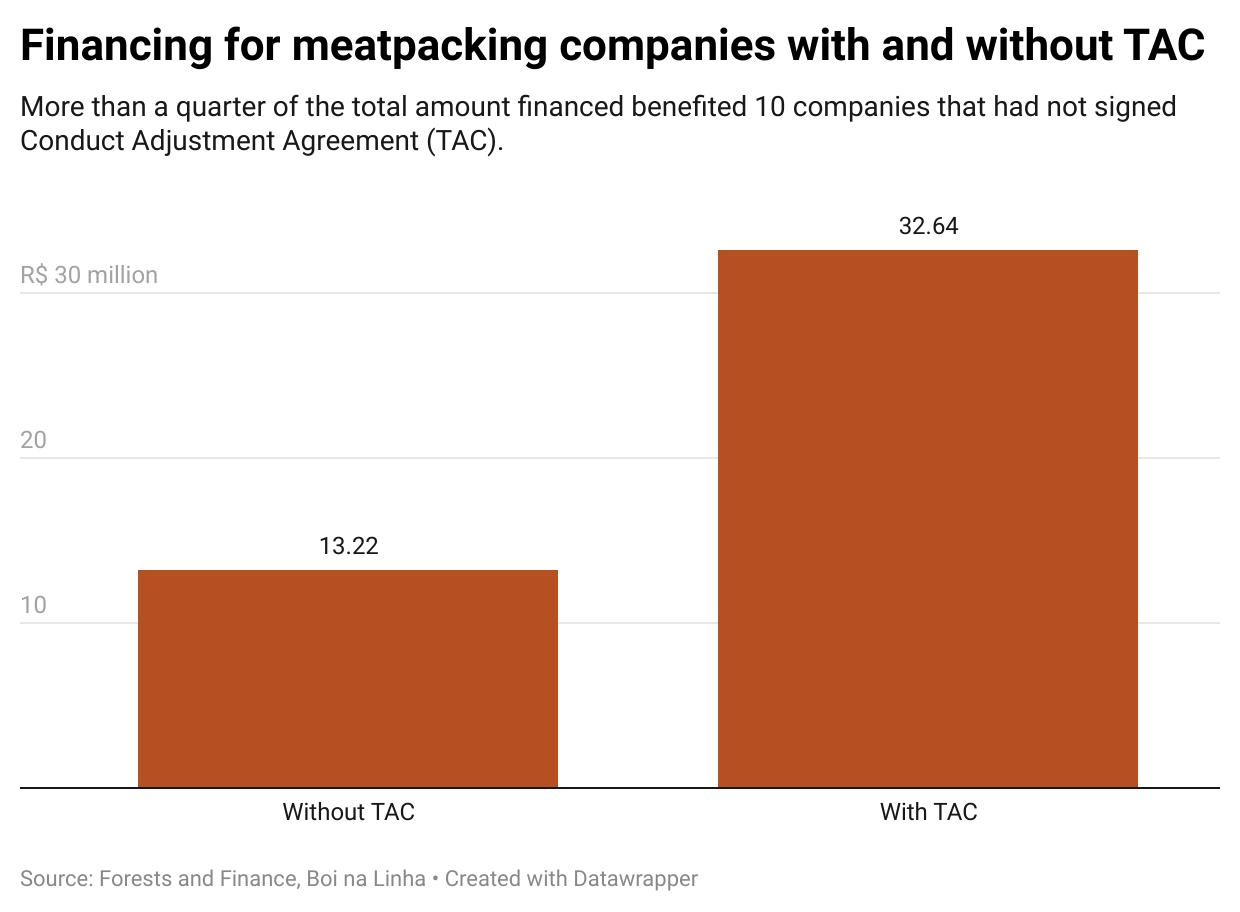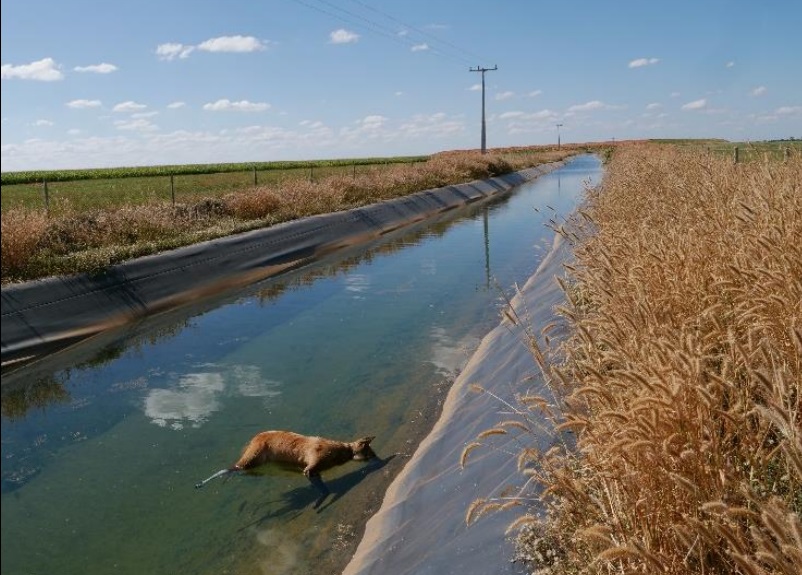Brazil’s National Bank for Economic and Social Development (BNDES) is financing meatpacking companies that slaughter animals raised on farms that have been illegally deforested, interdicted by Ibama, overlapping conservation units or indigenous lands, and that use slave labour in their activities. This is revealed by a Repórter Brasil exclusive report that looked into loans totalling R$ 46 million given to 25 small slaughterhouses located in the Amazon, where 90% of all the forest felled becomes pasture for livestock.
Since 2009, the bank’s internal regulations have banned loans to meatpacking companies that have farms with social and environmental irregularities among their suppliers. But the provision that determines that contracts should be cancelled in case of non-compliance was not followed in the cases found by Repórter Brasil.

“To obtain funding from BNDES, meat companies can only source cattle from suppliers that are not on the list of areas interdicted by Ibama. Furthermore, they cannot appear on the Ministry of Labour’s ‘dirty list,’” explained a press release published on the bank’s website in July 2009.
Nevertheless, in 2012, 2016 and 2017, meat companies Masterboi, São Francisco, Ribeiro Soares, Fortefrigo, Mercúrio (Pará) and Boi Branco (Mato Grosso) – all of which have BNDES funding – slaughtered at least 11,513 animals from farms interdicted by Ibama and 1,479 raised on properties included in Brazil’s dirty list of slave labour. A total of 25,158 head of cattle came from areas that did not even have environmental licenses to operate – another practice banned by resolution 1854/2009.
The irregularities were found by the Federal Prosecution Service (MPF) in audits carried out on the companies’ purchases, both in their own investigations (in the case of Boi Branco) and as a result of the Conduct Adjustment Agreements (so-called Meat TACs) that verify social and environmental compliance in their operations. In all cases, illegal slaughter was made public after BNDES signed contracts with the companies that, according to resolution 1854/2009, must provide statements saying that they do not source from irregular producers. False information must be sanctioned “with early contract termination without prejudice to applicable legal sanctions.”
In the case of the Masterboi, the contracts totalled R$ 10.5 million when the problems with suppliers were revealed. Mercúrio and Ribeiro Soares had loans of R$ 4 million each; Fortefrigo had R$ 1 million; and São Francisco (Sampaio) had R$ 100,000 in loans. Boi Branco’s contract, worth R$ 72,000, was signed a month before the company was sued by the Federal Prosecution Service for illegal slaughter at its plants.
BNDES’ Transparency Portal shows that part of these loans are still active — which indicates that the sanction provided for by resolution 1854/2009 was not applied.
After the article was published, BNDES informed in a statement that it “assembled a technical group to analyze the cases cited” and, if the alleged irregularities are proven, the bank will adopt “the appropriate contractual measures”. Initially, BNDES did not comment on the cases, despite the insistence of Repórter Brasil. Masterboi also sent a note only after the story was published, assuring that it fulfills its social and environmental commitments and that the irregularities pointed out were specific problems. The same justification was given by Mercúrio, Ribeiro Soares, and Carnes Boi Branco. Full responses can be read here.
The data used in this report were obtained by the Forests and Finance coalition, which monitors the support given by banks and credit institutions to potentially deforesting activities. The group tracked a total of US$ 2.3 billion in BNDES loans for livestock that threaten Brazil’s environment.
In early October, a new round of audits released by the Federal Prosecution Service in Pará — covering cattle purchases from January 2018 to June 2019 — showed that irregularities continue to go unpunished. Among the 16 companies assessed, Fortefrigo and São Francisco (Sampaio) came fourth and fifth in terms of noncompliance, with 18.7% and 15.2% of their purchases having some socio-environmental issue, respectively. JBS – the world’s largest producer of animal protein – tops the list of violations, with problems in 32% of its slaughter.
Itaú, BB and Bradesco should enforce rules
Loans granted to meatpackers with irregularities were intermediated by financial institutions that are BNDES partners: Itaú Unibanco, Banco do Brasil and Bradesco. According to resolution 1854/2009, in this type of loan – called automatic indirect – intermediaries must “require statements” from companies guaranteeing that they have systems in place to monitor their cattle suppliers and follow the standards required by BNDES. But, according to the Prosecution Service’s audits and investigations, that control was clearly flawed.
At least one of the several BNDES loans obtained by Masterboi through Itaú Unibanco remained active after the problems emerged. Ribeiro Soares still has two contracts signed through Banco do Brasil, even after violations were found. Both institutions said that they will not comment on specific cases because of corporate secrecy but listed their methods to verify social and environmental compliance before granting loans. The company’s full explanation can be read here.
Bradesco, on the other hand, has seven loans made with BNDES funds to Mercúrio and one to São Francisco (Sampaio), despite confirmation of environmental non-compliance. Bradesco also intermediated the contract with Boi Branco, which was scheduled to end in 2018. When contacted, the bank said it would not comment.
“Itaú Unibanco and Bradesco are two of the three largest private banks in Brazil that signed a pact to promote sustainable development in the Amazon. They are expected to follow the guidelines for loans in livestock,” observes Paulo Barreto, a researcher at Imazon (The Amazon Institute for Man and the Environment).

Risk ignored
The 25 small meatpackers investigated by Repórter Brasil were selected for putting 8 million hectares of Amazon forests at risk. The calculation, published in a 2017 study by Imazon, considers that its potential suppliers include many farms located in deforested areas, with interdictions already declared by Ibama or whose surrounding conditions indicate that devastation is imminent.
It is a territory the size of Austria and more than twice as large as the area threatened by JBS’s activities. The company is the largest meat manufacturer on the planet, which tops Imazon’s deforestation exposure list.

Hence the importance of monitoring suppliers. “Illegal cattle is the top driver of deforestation in the Amazon. If there is no control over the origin of the raw material, the risk of social and environmental violations is high,” says Prosecutor Ricardo Negrini, who works in Pará, where the first Conduct Adjustment Agreements for the Meat industry were signed in 2009.
Although BNDES requires that meatpackers have monitoring systems to check the origin of animals slaughtered, 10 companies that received a total of R$ 13.2 million did not sign the Meat Agreement with the Prosecution Service. According to the researcher from Imazon, this is a strong indication that those companies do not have such systems in place. “In general, companies that do not sign the Agreement do not monitor the cattle,” he notes.
Even Brazil’s largest meat industries – JBS, Marfrig and Minerva – only developed their systems after signing the agreement. Corroborating this suspicion, the Prosecution Service asked Ibama to tighten inspections on 7 of the 10 slaughterhouses that had BNDES loans but had not signed such agreements.
“Companies should demonstrate a basic level of compliance and organization so that the financial institution can feel safe when granting credit. These meatpackers are taking a lot of environmental risks, but they won’t commit to sectorial agreements and they get public funds anyway,” says Lisandro Inakake, who coordinates NGO Imaflora’s Boi na Linha project, a tool that provides greater transparency in cattle sourcing so that consumers can verify the origin of what they buy.

Deforestation without interdiction and cattle on indigenous land do not count
Even if the clause providing for early termination of contracts with companies that source from illegal areas were enforced, most of the problems would not be covered by resolution 1854/2009. According to the Prosecution Service’s audits, Masterboi, Mercúrio, São Francisco (Sampaio), Ribeiro Soares and Fortefrigo purchased 5,441 head of cattle raised on indigenous lands and 62,845 animals from illegally deforested farms. But according to BNDES, these suppliers should only be excluded from the supply chain if they were convicted of these crimes in all judicial instances.
BNDES loans given through commercial banks, such as those analysed in this article, also turn a blind eye to possible irregularities by indirect suppliers — those who sell animals to the farms that will then resell them to the companies.
Therefore, the almost R$ 2 million in fines imposed by Ibama on Mercúrio for the purchase of 3,767 head of cattle from interdicted farms would not be enough for the bank to sanction the company, since the animals entered the production line through indirect suppliers. The fact that the company’s indirect suppliers included ranchers that raised cattle in the Apyterewa Indigenous Land, in Pará, and farmers using slave labour, was also overlooked as revealed by Repórter Brasil in 2020 and 2021.
Resolution 1854/2009 determines that this link in the supply chain should only be monitored when loans are signed directly with BNDES or when the development bank becomes a partner in the companies, as is the case with JBS. Even that part of the rule, however, never got off the ground.
“Sustainability policies cannot be just words; they have to be actually enforced, with transparency and accountability to society,” concludes attorney Ricardo Negrini.

